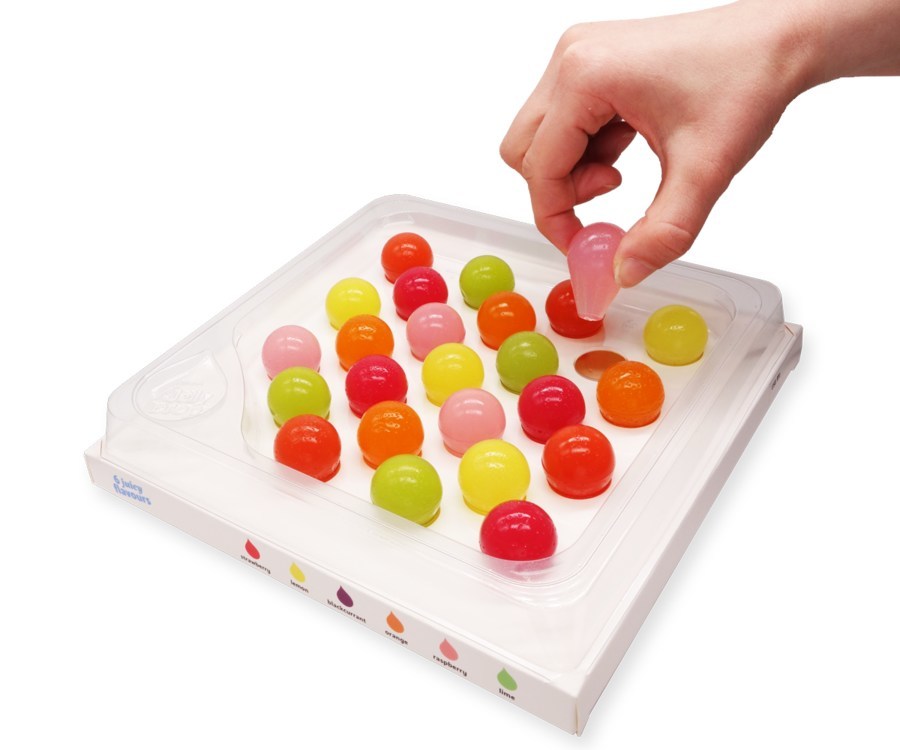Jelly Drops, a UK-based brand designed to boost hydration among those who struggle to consume enough water, announced it will be launching in the US. Made with 95 percent water, a grip-friendly shape and a variety of flavors, Jelly Drops have become popular among people with Alzheimer’s, seniors and others who struggle to stay hydrated.
“Since launch, we have made over 3 million drops, empowering countless seniors, people with dementia and many more, to support their hydration in an easier and more enjoyable way,” said Jelly Drops founder and chief product officer Lewis Hornby, in a press release. “We’ve already seen many people living with dementia enjoy and benefit from Jelly Drops and our team is excited to reach even more people and create joyful moments as we begin distribution of our water candies in the US.”
The idea behind Jelly Drops was born in early 2018, when Hornby’s grandmother, Pat, was hospitalized due to severe dehydration, which is a common challenge for those living with memory problems. Since they can forget to drink enough water, their existing conditions can worsen and cause a host of new ones. Hornby spent the next 18 months researching and developing Jelly Drops before making the final product available to the public in the UK in 2020.
Related: BUBLUV: The Ready-to-Drink, Healthier Bubble Tea Alternative
The bite-sized, teardrop-shaped candy has a solid, smooth texture that encourages independent hydration in those who may not realize they’re thirsty or otherwise may require assistance to drink. Jelly Drops are sugar free, low-calorie, gluten-free, vegan and non-laxative. They are available on a subscription basis and come in two different styles, the original tray and compact snackpots.
The product is backed by the UK’s Alzheimer Society’s Innovation Accelerator Programme and has received many honors including the National Dementia Care Awards Innovation of the Year in 2020. Since Jelly Drops have received an outpouring of demand for their contribution to people with dementia and the senior community, the team is expanding distribution to the US.
“Jelly Drops was one of the first innovations to be accepted into our Accelerator Programme, and we’ve been thrilled to support its journey to a widely-available product which is making a real difference to people with dementia,” said Colin Capper, Alzheimer’s Society’s head of research development, in the same press release. “Original products and designs like Jelly Drops are key to helping overcome the everyday challenges faced by people with dementia, challenges that have been further amplified by the pandemic.”
While Jelly Drops are the first product designed specifically for those who struggle to consume enough water, they are not the first water bottle replacement. The prototype for an edible water bottle called Ooho! was created in 2014 in London by a group of design students. Soon after, Rodrigo Garcia González and Pierre-Yves Paslier co-founded Skipping Rocks Lab.
The edible water bottle is a transparent sachet made from chloride and seaweed that contains one portion of water inside. It resembles a gelatinous sphere and it is safe to consume, but it is also biodegradable since it’s made with brown algae. While Jelly Drops were designed to boost water consumption, the edible water bottle was meant to reduce the reliance on plastic water bottles.
In the meantime, Jelly Drops will be available to US consumers starting in April 2022 with the end goal of being able to ship internationally.












Join or login to leave a comment
JOIN LOGIN